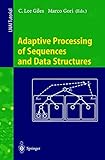Adaptive Processing of Sequences and Data Structures [electronic resource] : International Summer School on Neural Networks, "E.R. Caianiello", Vietri sul Mare, Salerno, Italy, September 6-13, 1997, Tutorial Lectures /
Material type: TextSeries: Lecture Notes in Artificial Intelligence ; 1387Publisher: Berlin, Heidelberg : Springer Berlin Heidelberg : Imprint: Springer, 1998Edition: 1st ed. 1998Description: XIV, 438 p. online resourceContent type:
TextSeries: Lecture Notes in Artificial Intelligence ; 1387Publisher: Berlin, Heidelberg : Springer Berlin Heidelberg : Imprint: Springer, 1998Edition: 1st ed. 1998Description: XIV, 438 p. online resourceContent type: - text
- computer
- online resource
- 9783540697527
- 004.2 23
- QA76.9.S88
Recurrent neural network architectures: An overview -- Gradient based learning methods -- Diagrammatic methods for deriving and relating temporal neural network algorithms -- An introduction to learning structured information -- Neural networks for processing data structures -- The loading problem: Topics in complexity -- Learning dynamic Bayesian networks -- Probabilistic models of neuronal spike trains -- Temporal models in blind source separation -- Recursive neural networks and automata -- The neural network pushdown automaton: Architecture, dynamics and training -- Neural dynamics with stochasticity -- Parsing the stream of time: The value of event-based segmentation in a complex real-world control problem -- Hybrid HMM/ANN systems for speech recognition: Overview and new research directions -- Predictive models for sequence modelling, application to speech and character recognition.
This book is devoted to adaptive processing of structured information similar to flexible and intelligent information processing by humans - in contrast to merely sequential processing of predominantly symbolic information within a deterministic framework. Adaptive information processing allows for a mixture of sequential and parallel processing of symbolic as well as subsymbolic information within deterministic and probabilistic frameworks. The book originates from a summer school held in September 1997 and thus is ideally suited for advanced courses on adaptive information processing and advanced learning techniques or for self-instruction. Research and design professionals active in the area of neural information processing will find it a valuable state-of-the-art survey.


There are no comments on this title.